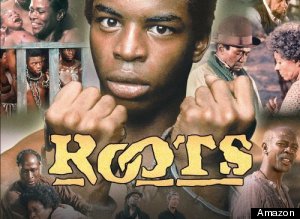 With Black History Month underway I would be remised of I did not pay homage to Alex Haley's groundbreaking television mini-series, “Roots”. This powerful story was the first time African Americans or dare I say the world got to see, and feel, what the slave experience was like. Sure we have seen pictures and read books but the visual presentation of the mini-series was an eye opening experience for most, as it remains one of the highest rated television shows of all time.
With Black History Month underway I would be remised of I did not pay homage to Alex Haley's groundbreaking television mini-series, “Roots”. This powerful story was the first time African Americans or dare I say the world got to see, and feel, what the slave experience was like. Sure we have seen pictures and read books but the visual presentation of the mini-series was an eye opening experience for most, as it remains one of the highest rated television shows of all time.
If you can recall the story chronicles the life of an African boy that began in Gambia, West Africa in 1750 where Kunta Kinte while trying to carry out a simple task to catch a bird sees white men carrying firearms, along with their black collaborators. He is captured by these black collaborators under the direction of white men, sold to a slave trader and placed aboard a ship to endure what we know as the Middle Passage for the long journey to America.
The ship eventually arrives in Annapolis, Maryland, where the captured Africans are sold at auction as slaves. He was sold to a Virginia plantation who gives Kunta the name Toby. The owner of the plantation assigns an older slave, Fiddler, to teach him to speak English and to train him in the ways of living and working as a chattel slave. Kunta in a persistent struggle to become free again makes several unsuccessful attempts to escape to preserve his Mandinka heritage and maintain his Mandinka roots.
The most chilling aspect of the story, for me, was when an overseer gathers the slaves and directs one of them to whip Kunta after his latest attempt to escape and continues whipping him until he finally acknowledges his new name. Then to settle a debt to his brother, the owner transfers several of his slaves, including Toby and Fiddler, to another plantation where Kunta tries again to escape, but a pair of slave catchers seize him, bind him, and chop off about half his right foot to limit his ability to run away again.
As we watched the mini-series it took us on a journey through generations of suffering until the climax when Chicken George, Haley’s grandfather, accumulated enough money to move his family to Tennessee to what was as close to freedom as they could hope for at the time. Chicken George purchased land based on the concept “God Bless the child that has his own”.
I don’t want to tell the whole story because I am sure you know it. If not the movie is well worth viewing again and again. There were then and some now, who say the epic journey of Kunta Kinte was a myth and that it was mere fiction. Those are the people who refuse to understand or see the wretchedness of the state sectioned institution of slavery. To you, unfortunately this is the foundation of America and for African Americans this is our sorted legacy that I will argue as a result the scares remain.
I’ll end by sharing these words by Maya Angelou: “history, despite its wrenching pain, cannot be unlived, but if faced with courage, need not be lived again.” We need to see this story and it was shown at the right time for us to understand! And that’s my Thought Provoking Perspective!










No comments:
Post a Comment